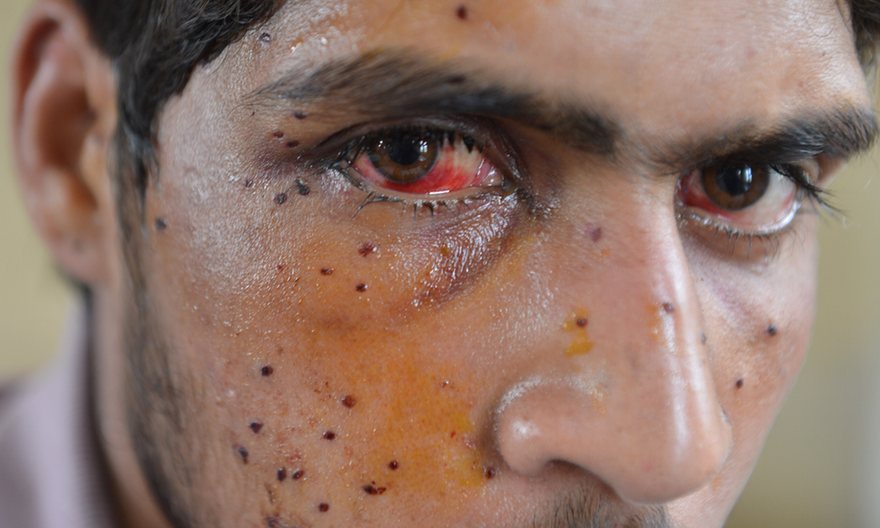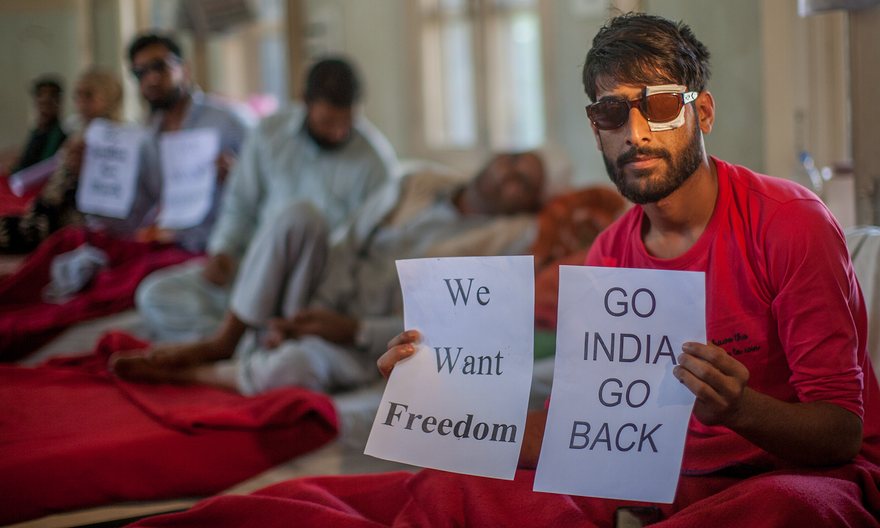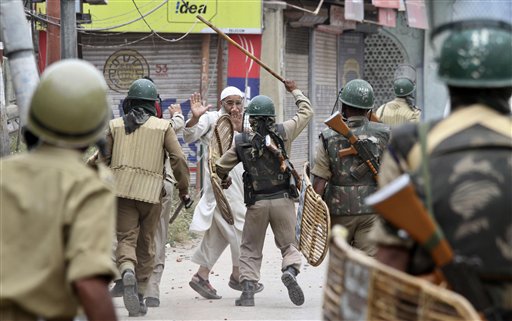Indian troops have thrown tear gas and clashed with protesters in Indian-administered Kashmir, as the Himalayan region marked the anniversary of a hugely popular separatist fighter's killing.
India imposed a widespread curfew, cut off both mobile and broadband internet services and deployed thousands of troops in Kashmir ahead of the anniversary on Saturday.
Residents said the restrictions on movement were some of the strictest they had seen, with some villagers told they would be shot if they left their homes.
The disputed region has seen an explosion of protests against Indian rule since government forces shot and killed Hizb-ul-Mujahideen commander Burhan Wani a year ago.
The death of the 23-year-old, who had built up a big following on social media, sparked an outpouring of grief and anger that spilled into the streets and led to months of clashes with security forces.
More than 100 people died in the months that followed and many more sustained serious eye injuries from the pellet guns used by government forces to quell the protests.
Shockingly, more than 500 people, most of them young, were shot in the face with the pump-action "pellet guns" that the Indian forces routinely use to suppress protests. These weapons discharge hundreds of small metal pellets, or birdshot, capable of piercing the eye.

Clashes erupted on Saturday after police and paramilitary troopers raided the home of the late Wani where people had assembled for fateha (prayers) on his first death anniversary.
Witnesses said that policemen and Indian forces asked Burhan's father Muzaffar Wani to vacate the tent erected inside the premises of his house in five minutes. Witnesses said that forces resorted to tear smoke shelling to chase away the protesting youth. Some shells, they said, landed inside the nearby shrine. Reports said that six youth were also detained during the clashes.
Meanwhile, Pakistan Army Chief General Qamar Javed Bajwa has said that the sacrifice by Wani and many generations are testimony of their resolve against Indian brutalities. In his message General Bajwa asserted that Kashmiris had right of self-determination.
India and Pakistan have fought three wars since their independence in 1947, two of them over the Muslim-majority Himalayan region of Kashmir which they both claim in full but rule in part.
The conflict in Indian-controlled Kashmir is basically a struggle for self-determination with residents of the region demanding a plebiscite while India rejects the call.

100,000 Kashmiris killed in Indian-administered Kashmir
According to estimates, nearly 47,000 people have been killed in violence that has erupted over Indian-held Kashmir more than two decades ago. Some rights groups in Kashmir say the toll could be close to 100,000 from the revolt which began in late 1989.
Residents of the Indian-administered state of Jammu and Kashmir have been demanding a referendum, and their demands have been met with a violent crackdown by Indian forces. The fact the majority of Kashmiris support secession from India has meant that New Delhi authorities will not give in to demands for a plebiscite.
In a report released on Thursday, Human Rights Watch (HRW) said a crackdown on violent protests in Jammu and Kashmir beginning in July 2016 killed over 90 people and injured hundreds, fueling further discontent against government forces.
Another report published in December, entitled Blind to Justice: Excessive Use of Force and Attacks on Health case in J&K, India, and Physicians for Human Rights stated that pellet guns are "inherently inaccurate, indiscriminate, and capable of penetrating soft tissues even at a distance".
The report gives a well-documented account of human rights violations in the second half of 2016: "The authorities lack respect for the right to health".
Kashmir conflict, legacy of British colonialism
The partition of British colonial India into the dominion states of India and Pakistan in 1947 led to the emergence of the Kashmir conflict. During the colonial era, in their infamous divide and rule strategy, Britain had appointed Hindu rulers on Muslim majority states and Muslim rulers where the majority was Hindu and Kashmir was no exception. At independence, Kashmiris had automatically expected that the state would become part of Pakistan by virtue of its overwhelming Muslim majority. But the Hindu maharaja (ruler) refused to make the announcement to join Pakistan as he wanted to join India but feared his overwhelmingly Muslim majority population and thus the conflict began and continues up to now. Thus the conflict in Kashmir is a legacy of British colonial mischief which is also afflicting many other parts of the world
LINK: https://www.ansarpress.com/english/7460
TAGS:































 online news tv
online news tv




